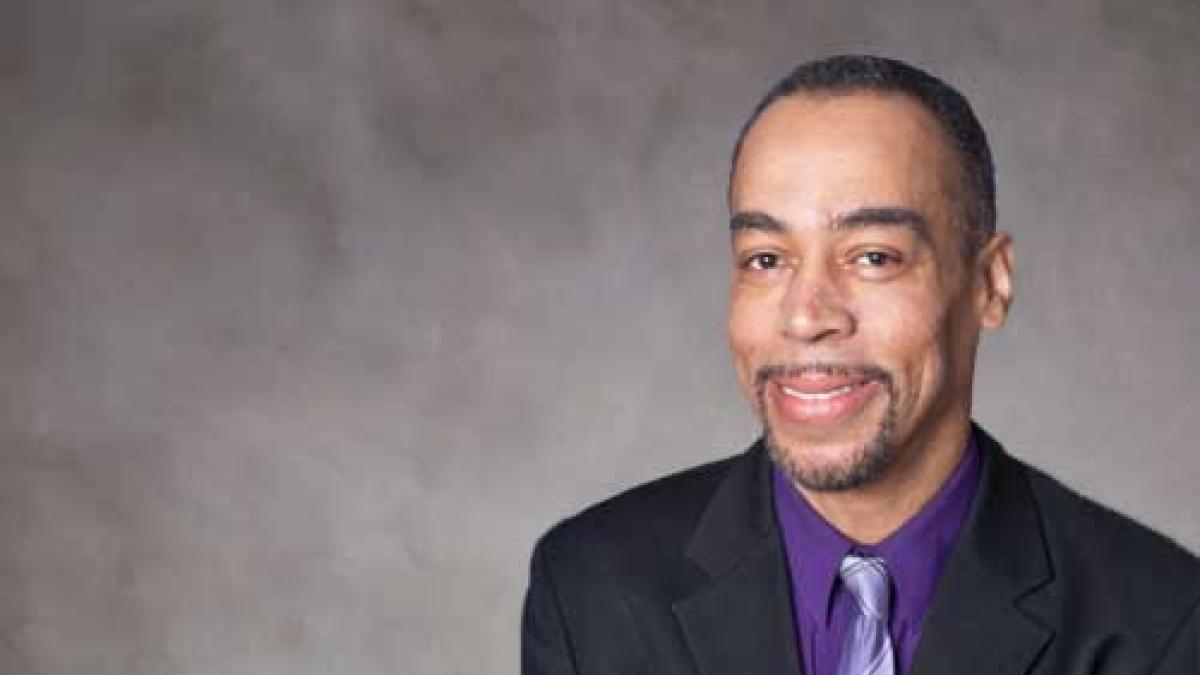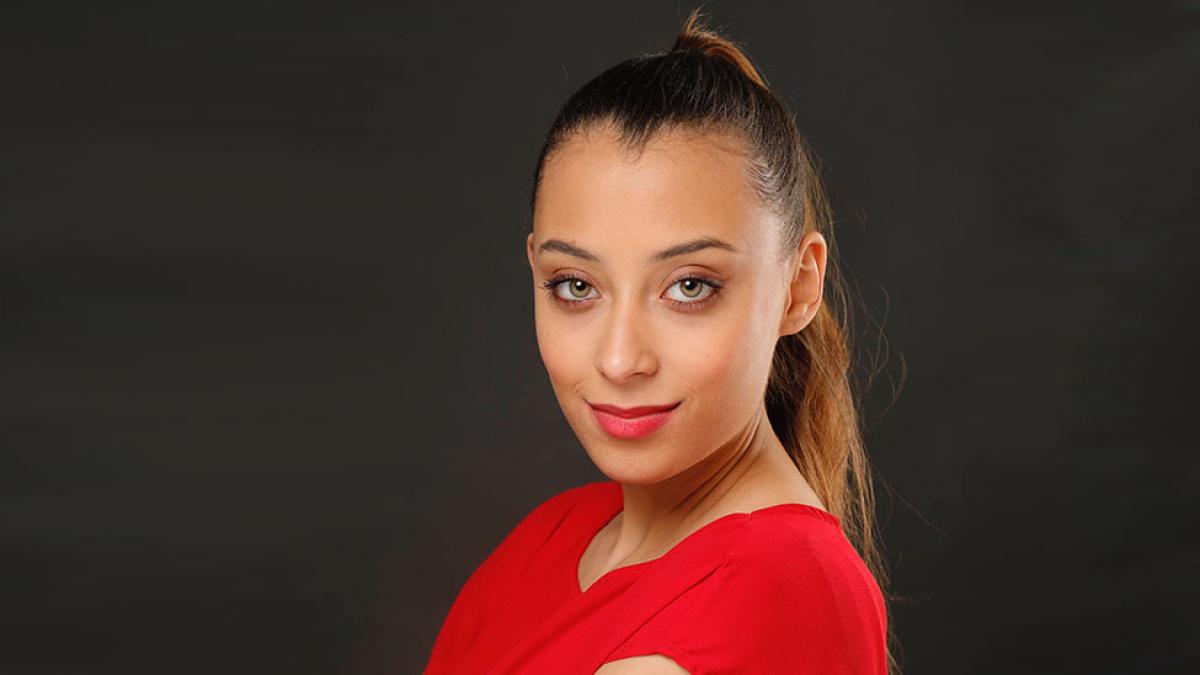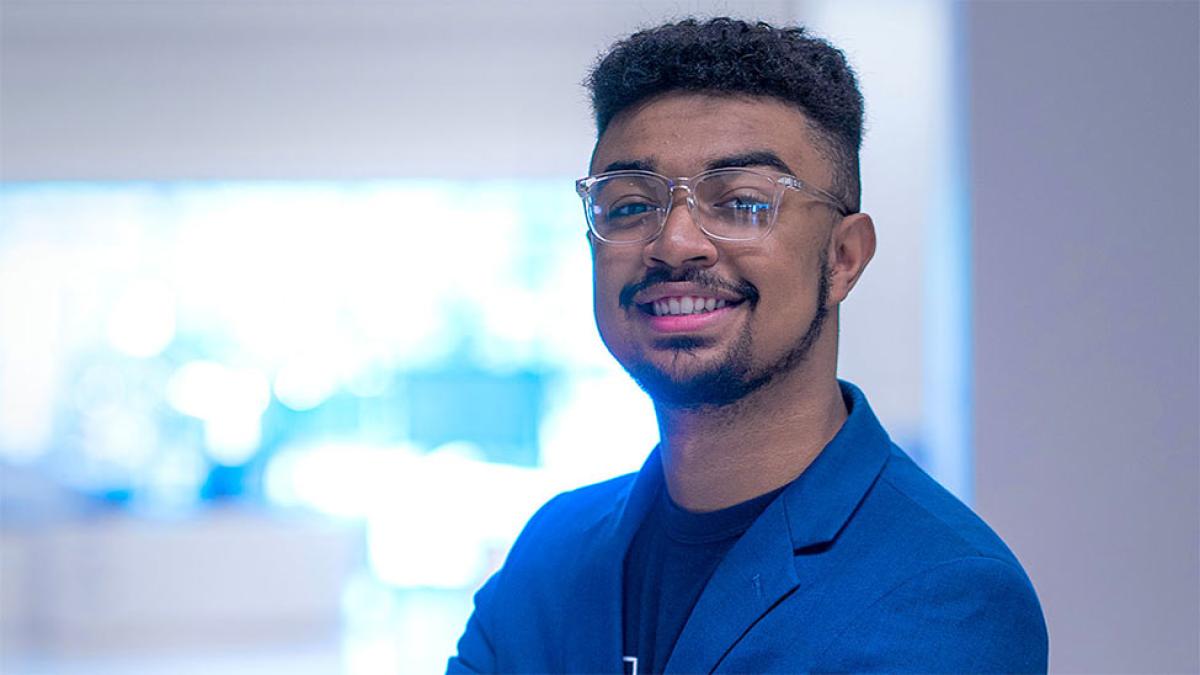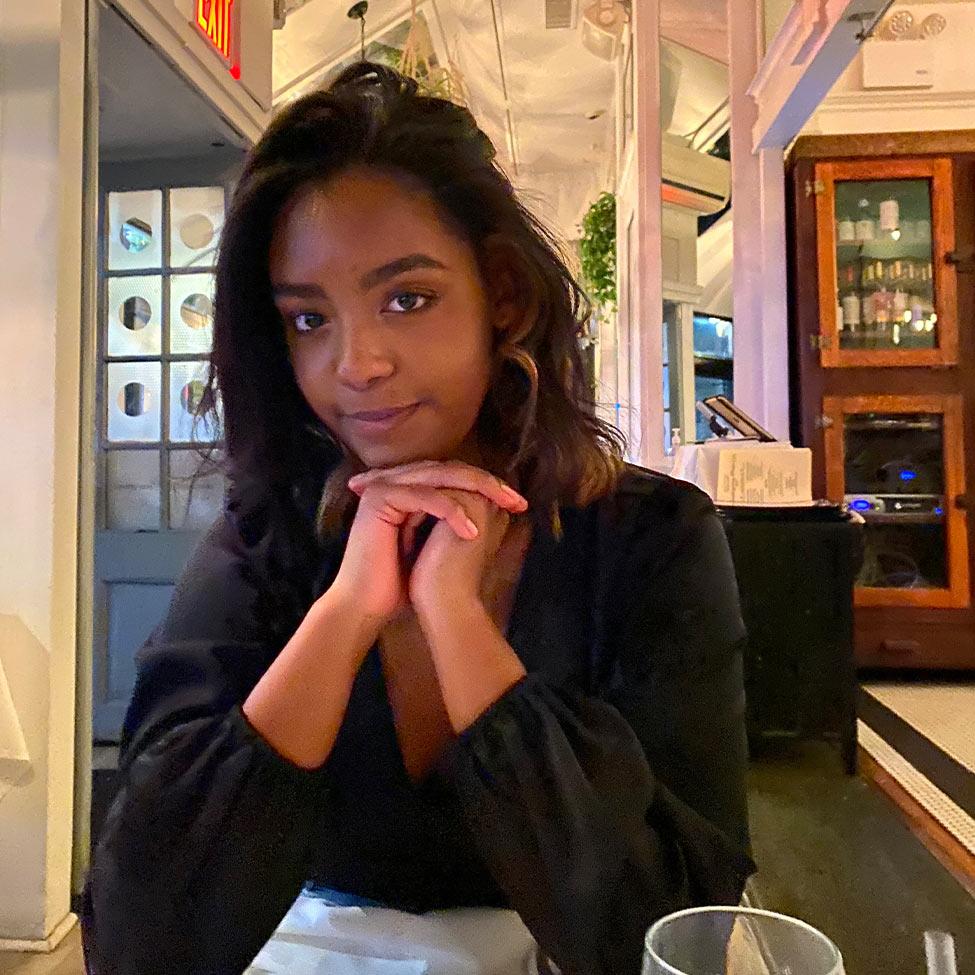
Q&A with A'ishah Muhammad '25
As a member of the pilot program for the Writing for Diversity and Equity in Theater and Media major, A'ishah Muhammad '25 is excited at how the program is continuing to grow, welcoming more voices and perspectives into their writers' room.
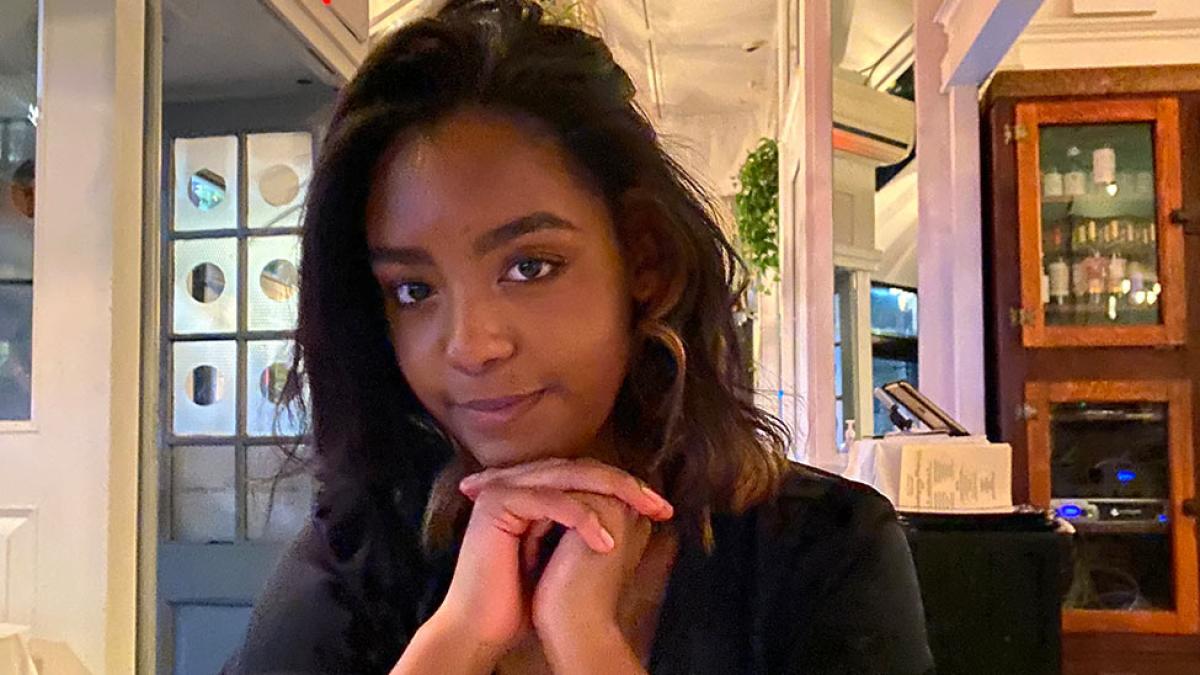

How did you decide to major in Writing for Diversity and Equity in Theater and Media?
I was initially drawn to Pace for performing, but I started freshman year as a Film and Screen Studies major. When I got to Pace, there was a meeting happening for a storytelling fellowship that I wanted to join, and that's how I met Brian. He was talking about the major and introducing himself. I was really inspired and gravitated to the work that he was doing. As a person of color, and someone who wants to work in film and theater and media, and as someone who writes, it's really important to me to have diversity and equity at the forefront of my work. To see someone who is a professional doing this work with real-life contacts in the industry, that was something that really stood out to me. I am someone that wants to get the most out of my education, so getting real-life access while also seeking a degree was important to me.
What drew you to Pace overall?
I've been involved in performing arts since I was a kid. I've been acting and performing since I was nine years old, and I went to a really good high school for performing arts, and we had an amazing theater program. My directors and everyone at that school really helped me cultivate my voice as an artist. I realized that that's what I wanted to do with my life, and I’ve never really doubted myself as a creative. I want to continue that education and learn from new people, and now I'm able to do that in a major that I feel suits my mission and what I want to contribute when taking up space.
When S. Brian Jones describes the program, he says the goal of the program is not necessarily to get students a seat at the table but rather to empower them to create their own table. What does that mean to you and how have you seen that come to life?
That means everything to me in the work that I'm doing. It's super important to me to create art, not with the intention of fitting into spaces that already exist and falling into norms within the industry that weren't made to welcome people who look like me, authentically, as we know. With the nature of how the industry works, people of color have to work "ten times harder.” I don't want to have to force myself to fit into environments that don't value my voice. Personally, I'm not writing to contribute and sell to major studios with a history of exclusion. I want to work with my peers. I want to work with people that look like me, as well as those with important stories from other marginalized communities. I personally am a Black and Indigenous woman, so I want to hold up stories that are speaking to those communities, of course. For me, my writing has been trying to treasure that, and realizing that, like all my peers, we all have unique voices, and we all have different stories that we want to tell.
What classes or experiences have impacted you most so far?
I currently am working with a screenwriting professor who is truly amazing. He’s a professional working writer at Hulu and HBO. I think that's the most we can get out of our education—learning from people who are actually doing the work that they're teaching you how to do. And I love screenwriting. I love analyzing how things are filmed from script with popular movies, especially seeing how things translate from the paper onto the screen. He really does a really good job of helping me understand that in ways that I didn't know before coming to Pace.
We also went on a field trip to The Players, which is a community space for people who work in the industry, whether it be writers or performers. We got to meet some artists and be shown around this very exclusive space. After these field trips, we’ll talk about what would we contribute to that space if we were in that environment. And I think that's Brian’s artistry—showing us all of this, and then asking us to envision ourselves in the space and to ask ourselves how we can make the space better. Because everyone can try to fit into a mold, but if you don't have a story to tell, then you're taking up space from someone who would have a story to tell. We are here to create space, and that's one of the many beautiful parts of this major.
As a person of color, and someone who wants to work in film and theater and media, and as someone who writes, it's really important to me to have diversity and equity at the forefront of my work.
What are your long-term goals?
My long-term goal is to work in the realm of directing, but I also see myself as a complete artist, and I think that's something that this major also really focuses on. We want to see ourselves as whole artists so that we can fit into different worlds of artistry and figure out what works for us. I’m in a video gaming narrative class right now taught by a Black woman, Novera King, who creates narrative writing for video gaming, which is the coolest job in the world. She explained all the stages of her career, which started in writing rooms. But she saw herself as a whole artist and didn't limit her ability, because writing is not just about writing for the screen or stage, but if you have a story to tell, it can fit into so many different genres of artistry, such as video games. Film directing is a goal, and that's genuinely what I would love to do, but I really value writing, so you could also say that I want to be a screenwriter. Right now, I am creating stories that someday I would love to see put on screen.
What are you looking forward to most for the rest of your time in this program and at Pace?
I'm most excited to see the cohorts under us come up because we were in the pilot program. I'm a member of the first group of people in this major, and I could count on one hand how many people there were that first semester. Now we have a full table of people coming into my third semester in the major. It's really exciting to see freshmen who are able to start out in the major. I hope we’re setting a good example for them and getting new and younger voices into the room to contribute. I'm really excited to see the progression of our writers’ room. I want to see it get bigger. I want to see it get more diverse. I want to see more faces. I want to see more people with differing experiences that are willing to share because that's what this medium is all about: collaborating with your peers and taking in other people's perspectives.
What would you tell a younger student who's considering majoring in this program?
I would say if writing is important to you and you're looking to cultivate your voice as a writer, then this is the major for you. If you value DEI in media that you consume and you want to create media that's going to be consumed by someone who looks like you or looks like your peers, then this is the major for you. You’re going to get a lot out of it, and you're going to learn so many skills and get in contact with so many people and have access to cool opportunities that a lot of other majors don't necessarily have access to. That's the exciting thing about this program—it's only getting started and we're already experiencing all of these cool things. And with the Rothschild funding being renewed, it's so exciting to see all of the possibility that we now have.
More About the Major
As a first-generation Mexican-American and college student who has always been fascinated by film and theater, Cambria Kylinn Martin '24 is relishing the opportunity to explore identity and intersectionality through the Writing for Diversity and Equity in Theater and Media program.
Dreana Henry '26 is among the first students to come to Pace specifically to major in Writing for Diversity and Equity in Theater and Media. She's fully embracing the industry connections she's already made, while looking forward to pursuing more opportunities the program—and New York City overall—have to offer.
Pace University’s Bachelor of Arts in Writing for Diversity and Equity in Theater and Media Arts, housed in the Dyson College of Arts and Sciences, has received a two-year, $609,000 grant from The Edmond de Rothschild Foundation that continues its support of the program.
Q&A with Dreana Henry '26
Dreana Henry '26 is among the first students to come to Pace specifically to major in Writing for Diversity and Equity in Theater and Media. She's fully embracing the industry connections she's already made, while looking forward to pursuing more opportunities the program—and New York City overall—have to offer.
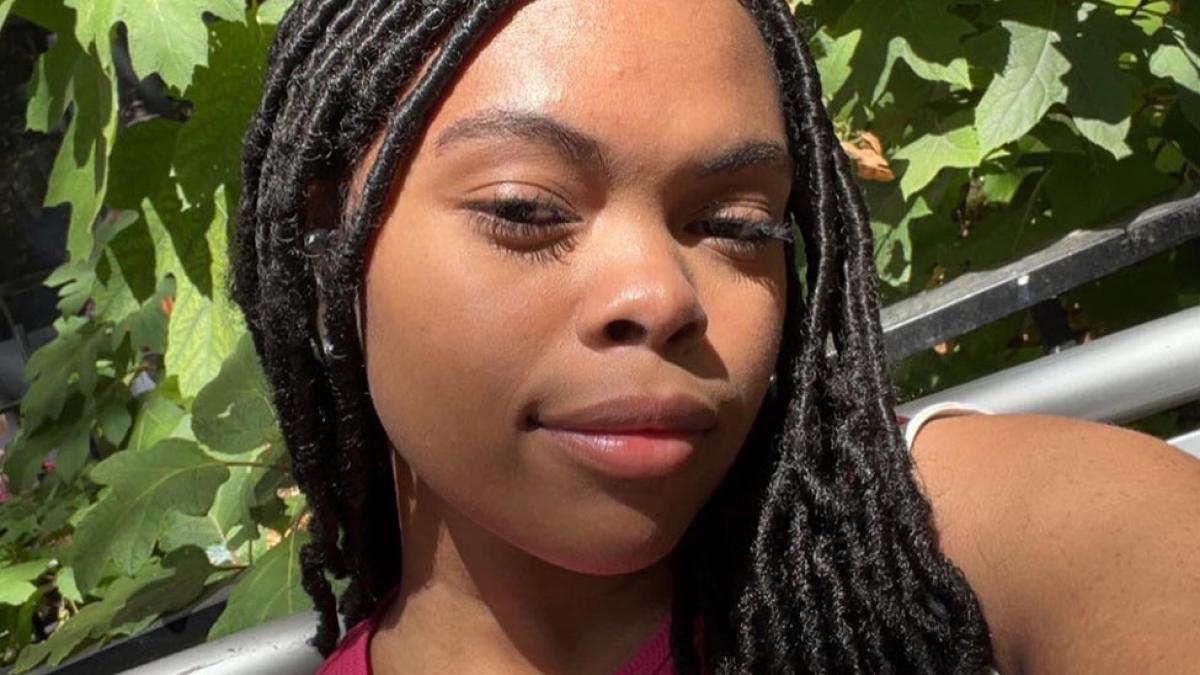
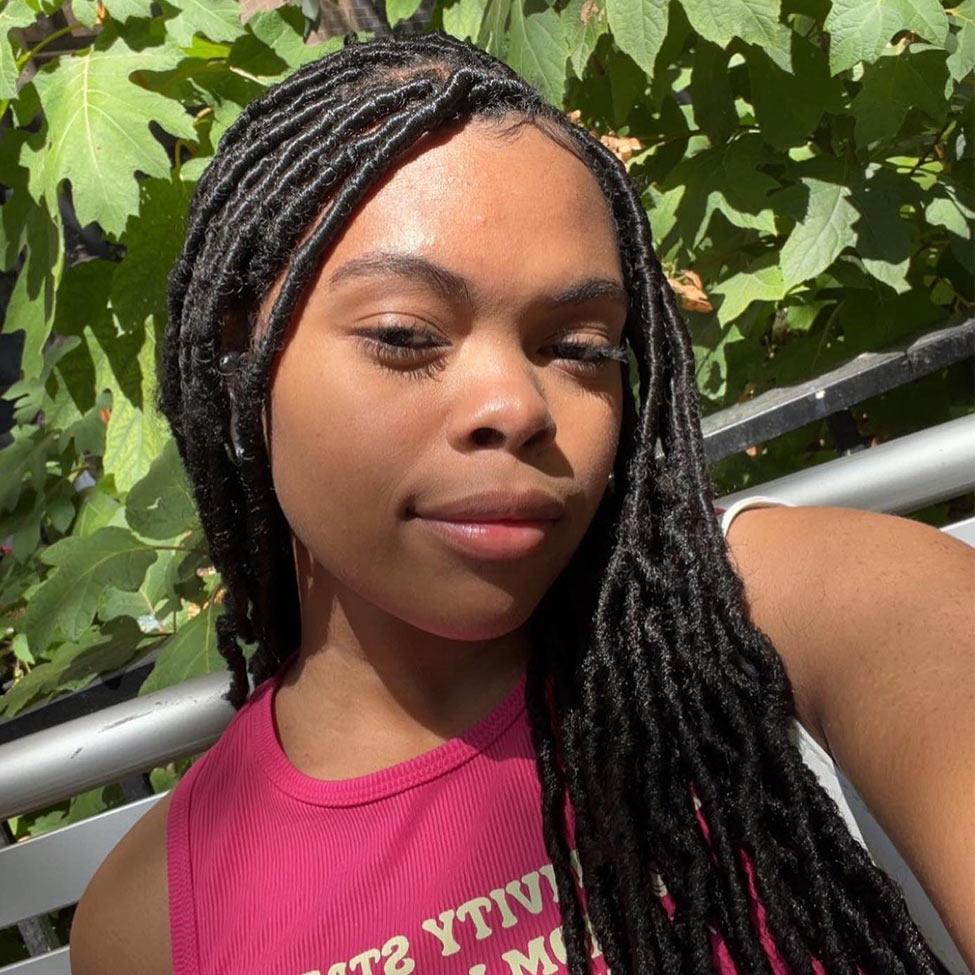
As a first-year student, did you know about this program when you were applying to Pace?
I did, actually. Originally, I was looking for a creative writing major or a screenwriting major. When I was looking, I saw that Pace had a Writing for Diversity and Equity in Theater and Media major, which is exactly what I wanted to do, so that's why I ended up choosing to apply. I knew Pace had a great arts program, so that drew me to Pace overall.
What drew you to this program specifically?
I've never actually seen a major that was super focused on diversity and equity all around, so I thought it was really interesting that there was a program where I could learn not only how to screen write, but to write novels too. I had never seen something that was so diverse in that way.
When S. Brian Jones describes the program, he says the goal of the program is not necessarily to get students a seat at the table but rather to empower them to create their own table. What does that mean to you and how have you seen that come to life?
I've always thought, “Oh, I want to work for Warner Brothers,” or I want to work for any other big writing company or theater company. But I've always had to ask, do they produce the things that I want? Do they produce the shows or the movies that I can see myself being a part of in any way? And usually, I have a hard time answering that question. I don't want to form my art to fit in a place that doesn't belong to me. I’d rather create my own.
What are your long-term goals? And how do you think this program can help you get there?
Some of my long-term goals are to write a screenplay and to act as well. I think this major is really going to help me because I've already been introduced to local companies such as The New York Theater Workshop. I've been exposed to all these great theaters and met a bunch of actors and writers and costume designers who are already in the business. I've only been here for a month and a half, and I'm already learning a lot about what the business is like.
I don't want to form my art to fit in a place that doesn't belong to me. I’d rather create my own.
Are there any challenges you've overcome that you're proud of and would like to share?
One of the biggest challenges has been coming to New York and trying to find my place in the city. I’m trying to figure out how I'm going to navigate following my dreams, what path I should take, what opportunities I should take, and how to get those opportunities. It's a big challenge of exploration and taking charge of what I want to do next.
Being in their shoes not too long ago yourself, if a prospective student was considering majoring in this program, what advice would you give them?
I'd tell them to come in with an open mind and to not expect to be the best of the best. Don't put any pressure on yourself to know what you're doing or to know what you want to do in the future, because it's all about the journey and exploration.
Is there anything else you'd like to add about the program or your time so far?
I really do enjoy the program. We have cohort meetings where we all get together and talk about things in the media and how it relates to equity and inclusion and how we feel about it. For example, we were talking about the new Little Mermaid movie that’s coming out and how a lot of different people feel about that. It brings up a lot of good conversations. It really gets you thinking about the writing world.
More About the Major
As a member of the pilot program for the Writing for Diversity and Equity in Theater and Media major, A'ishah Muhammad '25 is excited at how the program is continuing to grow, welcoming more voices and perspectives into their writers' room.
As a first-generation Mexican-American and college student who has always been fascinated by film and theater, Cambria Kylinn Martin '24 is relishing the opportunity to explore identity and intersectionality through the Writing for Diversity and Equity in Theater and Media program.
Pace University’s Bachelor of Arts in Writing for Diversity and Equity in Theater and Media Arts, housed in the Dyson College of Arts and Sciences, has received a two-year, $609,000 grant from The Edmond de Rothschild Foundation that continues its support of the program.
Q&A with Cambria Kylinn Martin '24
As a first-generation Mexican-American and college student who has always been fascinated by film and theater, Cambria Kylinn Martin '24 is relishing the opportunity to explore identity and intersectionality through the Writing for Diversity and Equity in Theater and Media program.
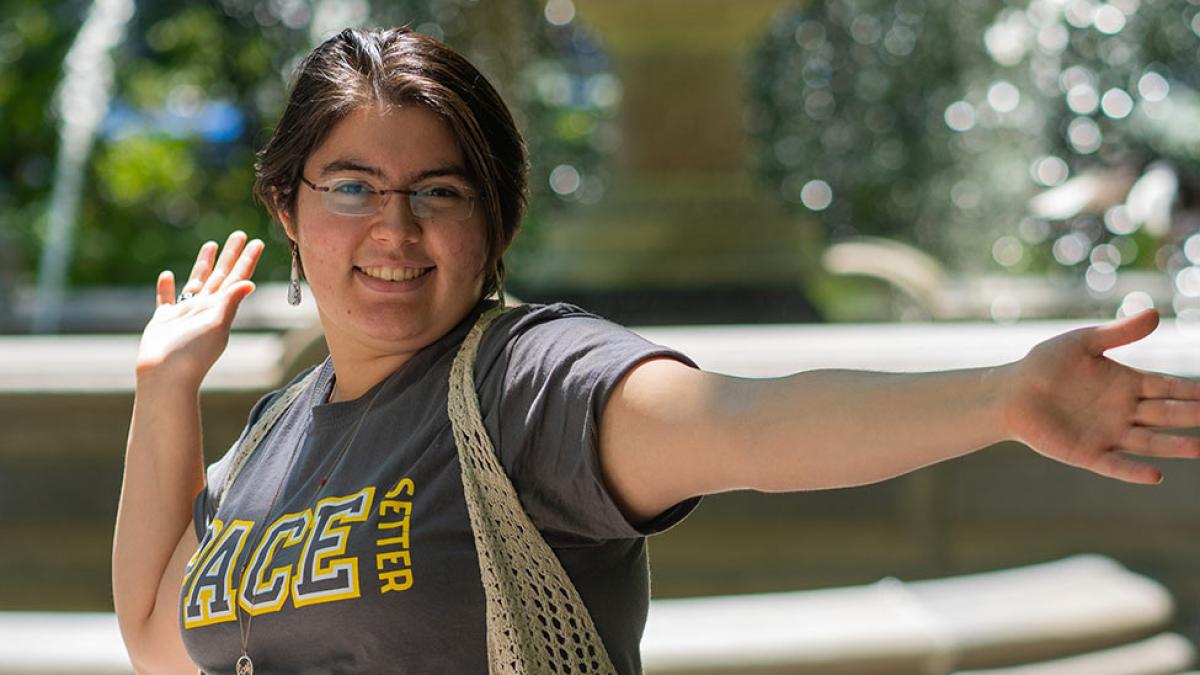
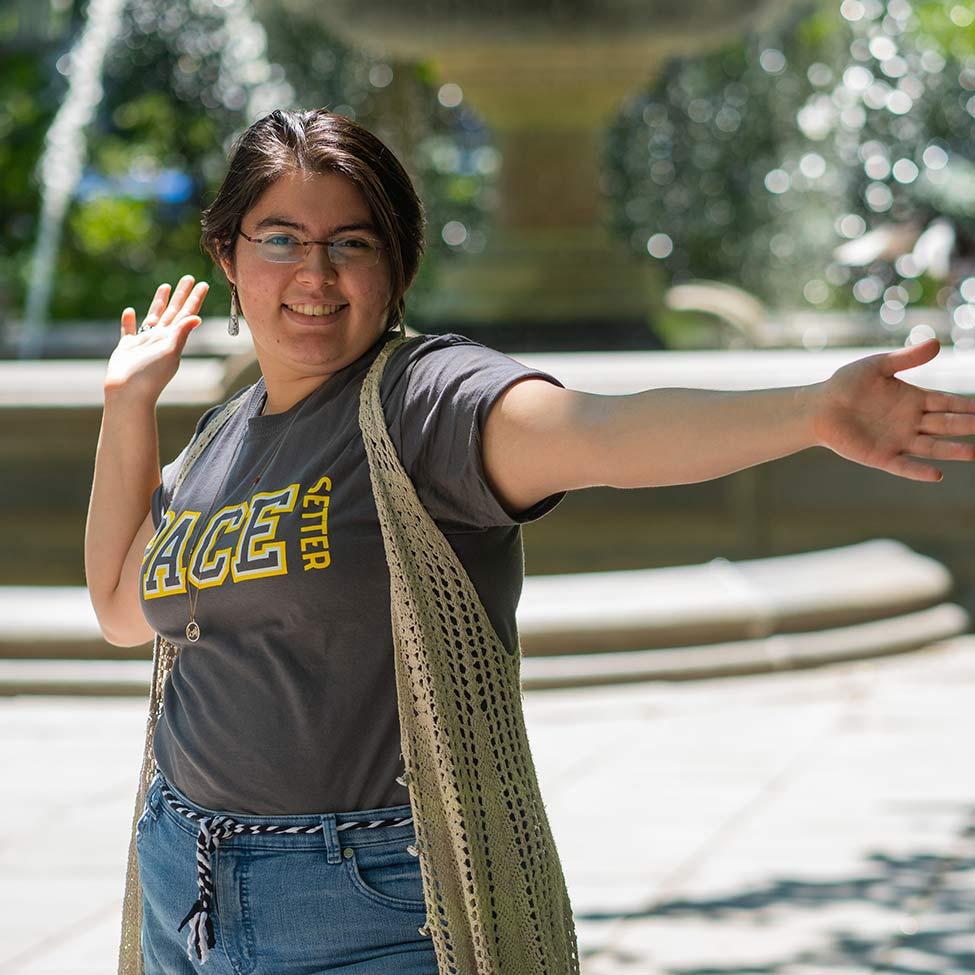
What drew you to Pace?
I applied to Pace on a whim because I wanted to go to New York. I heard of Pace from a student stage manager in our senior production in high school in Santa Monica, California. I’ve always had a fascination with film and theater, and I never had been to New York before, but I wanted to go. So I packed my bags and came to NYC in fall 2020 with all the fears and hopes for the future.
What drew you to the Writing for Diversity and Equity in Theater and Media program?
I found out about the program when I was helping people move in as part of my responsibility as vice president for the Residence Hall Association (RHA). I attended a webinar introducing the new major, and then I went and met S. Brian Jones. I felt like it was serendipitous that I ended up at Pace and that this program came about, because the program was explained in the words that I have always used to describe what I wanted to do. My parents are from Jalisco, Mexico and within the lives of my parents, siblings, and me, there was a lot of assimilation that was done. I never saw myself or any of my family represented in the media. Even as a pale Latina, with colorism heavily present in media, I noticed from a young age the binary that looms over the concept of identity with race and ethnicity. When I talked to Brian, we bonded about Cinderella with Brandy and Whitney Houston from 1997, and we just could not stop talking about what we want to see represented of ourselves, our identities, and our families in media. That’s when I knew that we were going to get off on the right foot.
Which classes or experiences from the program so far have had the greatest impact on you?
For my first class in the major, I got to do Creative Writing: Drama and learn how to actually be a playwright. I had a professor who also has a connection to Mexico as a Chicano, which was a rare thing to find because I feel like I haven't met a lot of Mexican-Americans or Chicanos here in New York. Having that professor, Beto O’Byrne, understand the cultural things I'm talking about has been a core thing and form of guidance for me.
When S. Brian Jones describes the program, he says the goal of the program is not necessarily to get students a seat at the writers’ table but rather to empower them to create their own table. What does that mean to you and how have you seen that come to life?
Even before high school, I knew I wanted to do something in theater or film, something especially centering on identity, specifically Latin American identity and all of its intersectionality. S. Brian Jones is someone who you can feel an immediate intellectual connection with. We understand each other, and we understand artistically how we want to approach things. To think about making my own table, I feel very privileged to be able to have that opportunity, and I hope to be able to do more with that platform, whatever it might be. I think about when I was a little kid watching Brandy in Cinderella—I think about those little kids who probably have not seen themselves on screen, on stage, in literature, or anything with identity and all its facets of race, ethnicity, culture, sexuality, etc. To be able to think that with this program, with the people that I'm meeting who are in my cohort, to have the ability to give that experience [to see themselves on the screen] to more kids, it just warms my heart and keeps me going.
To be able to think that with this program, with the people that I'm meeting who are in my cohort, to have the ability to give that experience [to see themselves on the screen] to more kids, it just warms my heart and keeps me going.
Have you participated in any internships?
Through my Pace Storytelling Fellowship, I got to have an internship in the summer with the Atlantic-Pacific Theater here in New York, which was the first time I got to do theater since the pandemic. It was at the New Ohio Theatre, as part of the Ice Factory Festival 2022. I was a stage manager, and I got to do familiar things in that role since I’ve done it and numerous other roles like it, before back home at Morgan Wixson Theatre, and I was also learning how to help in all facets of the production as an adult. I also got to shadow my mentor, Beto O’Byrne, in the new show they’re working on, since they finished their previous show that was also at that same theater, which was another full-circle moment.
Are there any challenges you have overcome that you’re proud of and would like to share?
I'm a first-generation Mexican-American, but also a first-generation college student, and this is all very new. Even if there wasn't a pandemic, it's very new, and everything would be daunting. I’m just trying to trust the process, which is something we would always say in theater tech. I try to tell myself to trust that everything happens for a reason.
What are your goals for the future?
I know S. Brian Jones would say to try and go into a less populated and oversaturated market for entertainment. But I worked so hard to come to New York, and I would love to stay in New York in theater or go back to California to LA to work in film. I think during these next two years before I finish college, since these first two went by so quickly, I'm just going to try to remind myself that it's okay to make mistakes and to keep cultivating those relationships that actually feel genuine rather than just networking for networking’s sake. I’ve wanted to write, act, direct, and produce since I was a little kid getting lost in a movie and/or musical, so there is always the hope to learn more and expand. I do hope to have a production company of some sort that can focus on Latin American identity, but not be exclusive to it. Our culture is so large that I want to cultivate a space where we can have our stories told by us. I am only one type of Latin American, so I want to have more of our voices in the cultural zeitgeist so that people can see who we really are as an ethnicity full of different countries, languages, races, religions, and so much more that cannot be encapsulated and/or expressed by one single person. It’s a group effort, and I hope to contribute to it.
More About the Major
Dreana Henry '26 is among the first students to come to Pace specifically to major in Writing for Diversity and Equity in Theater and Media. She's fully embracing the industry connections she's already made, while looking forward to pursuing more opportunities the program—and New York City overall—have to offer.
As a member of the pilot program for the Writing for Diversity and Equity in Theater and Media major, A'ishah Muhammad '25 is excited at how the program is continuing to grow, welcoming more voices and perspectives into their writers' room.
Pace University’s Bachelor of Arts in Writing for Diversity and Equity in Theater and Media Arts, housed in the Dyson College of Arts and Sciences, has received a two-year, $609,000 grant from The Edmond de Rothschild Foundation that continues its support of the program.
Pace Environmental Law Review (PELR) hosts annual Environmental Law Symposium
The Pace Environmental Law Review (PELR) held its annual symposium titled “Environmental Constitutionalism” on Friday, October 28, 2022. Hosted by the Elisabeth Haub School of Law at Pace University, the virtual symposium attracted over 100 attendees, bringing together scholars, advocates, regulators, policymakers, and students worldwide to discuss constitutional environmental rights.
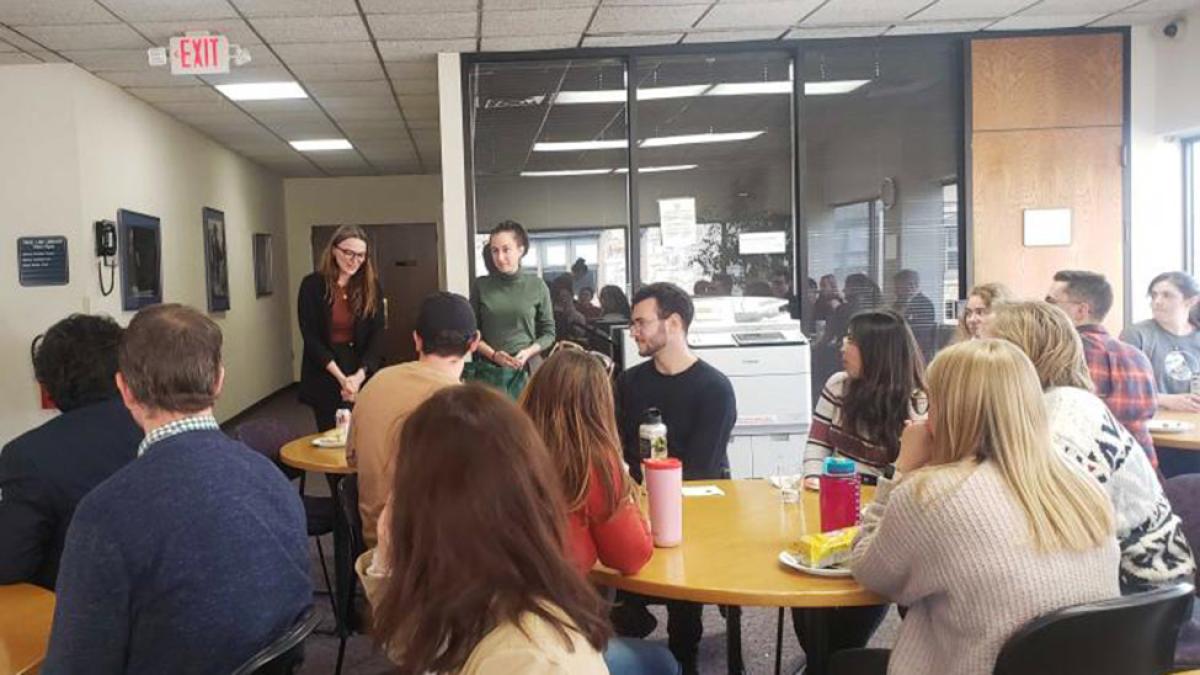
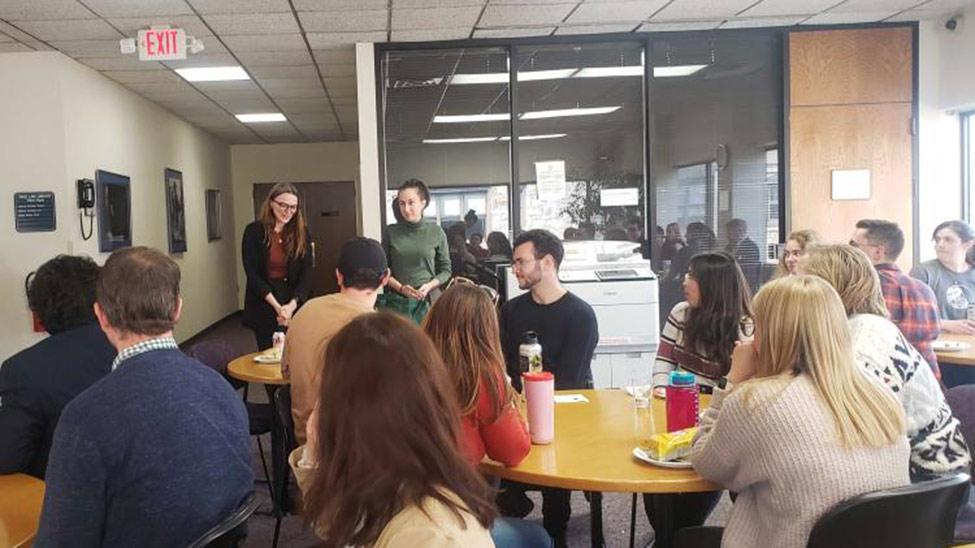
The Pace Environmental Law Review (PELR) held its annual symposium titled “Environmental Constitutionalism” on Friday, October 28, 2022. Hosted by the Elisabeth Haub School of Law at Pace University, the virtual symposium attracted over 100 attendees, bringing together scholars, advocates, regulators, policymakers, and students worldwide to discuss constitutional environmental rights.
How can people assert constitutional environmental rights? Can these rights help fill the legal gaps for action on climate change or environmental justice? What can we learn from the experience adopting and implementing environmental rights to date? After an opening note by Haub Law alumna Maya van Rossum ‘92, Founder of the Green Amendment For The Generations Movement & Author of The Green Amendment, Securing Our Right to a Healthy Environment, the 17 participants addressed these questions and more.
The panelists, and their topics, included:
Prof. James May of Widener University Delaware Law School - Are environmental rights, thus far, altering environmental outcomes?;
Prof. John Dernbach of Widener University Commonwealth Law School - Why Environmental Rights Matter;
Prof. Suryapratim Roy & Alexandru Gociu of Trinity College Dublin - Climate Litigation and the Norwegian Constitutional Principle of Sustainability in Human Rights Context;
Prof. Quinn Yeargain of Widener University Commonwealth Law School - State Constitutions in the Woods;
Timothy Cox of Catskill Watershed Corporation - New York Forever Wild;
Prof. Heidi Gorovitz Roberston of University of Maine School of Law - Considerations for the crafting of subnational constitutional rights to a clean environment;
Prof. Michael Lewyn of Touro Law - Environmental Rights Amendments: What Could Go Wrong;
Prof. Heather Tanana & Elisabeth Parker of the University of Utah S.J. Quinney College of Law - Indigenous People’s & Healthy Environment;
Prof. Rebecca Bratspies of the City University of New York School of Law - Administering Environmental Rights: Using New York’s New Green Constitutional Amendment to Build a Statewide Culture of Environmental Justice;
Prof. Steven Ferrey of Suffolk Law School - State ‘Federalism’ Blocking the Biden Sustainable Infrastructure Improvements in the U.S.;
Prof. Sonya Ziaja of University of Baltimore School of Law - Secret Lives of Environmental Rights; and
Prof. Sean Lyness of New England Law School - The Constitutional Public Trust in a Warming World.
“It is encouraging to see how many thoughtful scholars around the world are working to understand the potential role of environmental rights in building a sustainable future,” said Haub Distinguished Professor of Environmental Law and PELR Advisor, Professor Katrina Fischer Kuh. “I applaud the PELR for providing a forum to share learning and ideas about the adoption, implementation, and assessment of environmental rights approaches and anticipate that the symposium articles will make important contributions.”
The panelists’ articles will be published by PELR in the next year. PELR has a robust history of environmental publications dating back decades, which can be found on the PELR website. Haub Law launched its Environmental Law Program in 1978, and it has long been ranked among the world’s leading university programs, with a current #1 ranking by U.S. News and World Report.
Haub Law Students from Fairbridge Investor Rights Clinic Win Arbitration Round at National ADR Triathlon
A team of students from the Elisabeth Haub School of Law won first place in the arbitration round at the 13th annual Securities Dispute Resolution Triathlon, held virtually on October 15 and 16, hosted by the Hugh L. Carey Center for Dispute Resolution at St. John’s School of Law and the Financial Industry Regulatory Authority (FINRA). The team of three students included 3L Mary Neil, 3L Roberto III Quiroga, and 3L Aric-James Prazeres, who all represent the Law School’s Fairbridge Investor Rights Clinic as current or former interns.
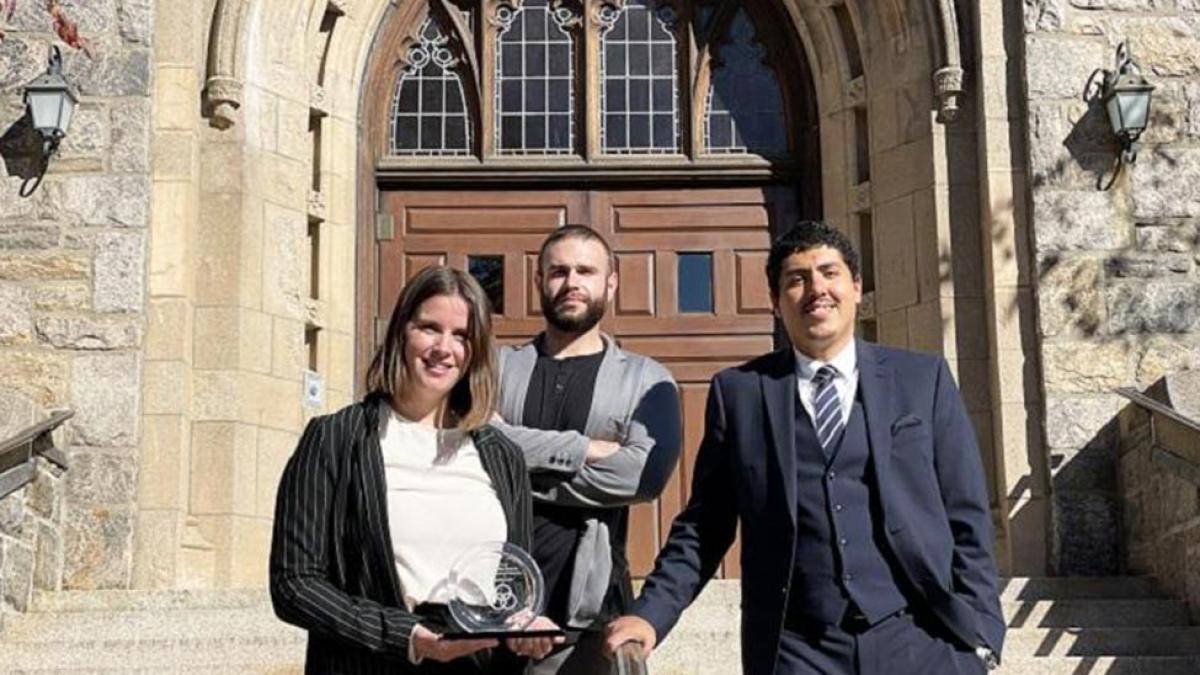
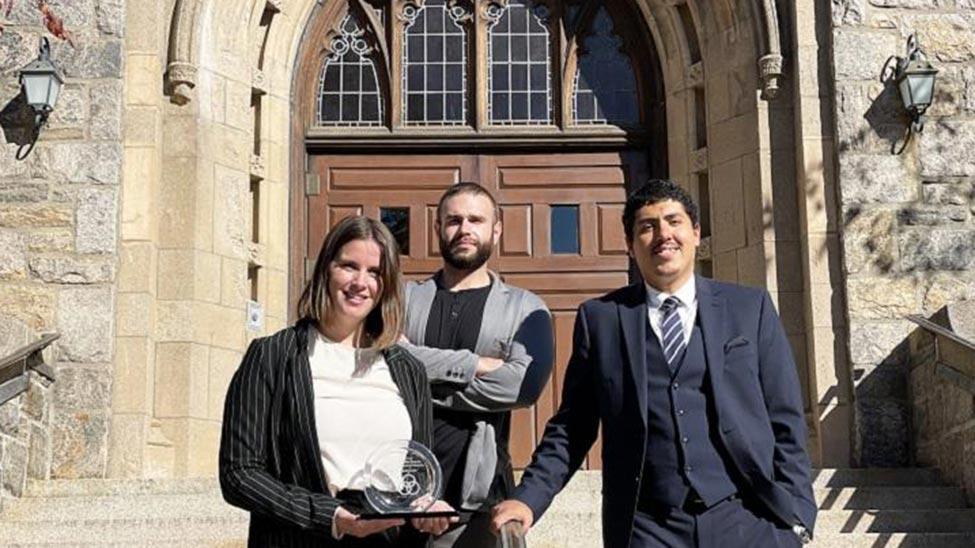
A team of students from the Elisabeth Haub School of Law won first place in the arbitration round at the 13th annual Securities Dispute Resolution Triathlon, held virtually on October 15 and 16, hosted by the Hugh L. Carey Center for Dispute Resolution at St. John’s School of Law and the Financial Industry Regulatory Authority (FINRA). The team of three students included 3L Mary Neil, 3L Roberto III Quiroga, and 3L Aric-James Prazeres, who all represent the Law School’s Fairbridge Investor Rights Clinic as current or former interns.
Fairbridge Investor Rights Clinic alum Britny Auletti ’17, Associate Attorney at Eversheds Sutherland, served as the main coach for the team, with coaching support provided by Haub Law Professor Elissa Germaine, Executive Director of John Jay Legal Services and Director of the clinic.
“I am proud of the hard work and collaborative team effort of our students, which resulted in an amazing outcome,” said Professor Germaine. “The students’ experience in the clinic helped them prepare for and succeed in the Triathlon, and their participation in the Triathlon will help them in representing our clinic clients – novice investors of modest means like the client in the competition problem – and in their work after graduation.”
The Securities Dispute Resolution Triathlon is a two-day competition that tests law student ability in each of the three main ADR processes—negotiation, mediation, and arbitration. Students compete as advocates, settlement counsel, and clients in a securities dispute. At the outset they attempt to negotiate a resolution, then they represent their clients in mediation, and finally they proceed to arbitration before a three-person panel.
Members of FINRA’s roster of experienced neutrals serve as mediators, arbitrators, and judges, critiquing the student teams and offering the students an invaluable real-life experience. In addition to honing the students’ advocacy and ADR skills, participation in the competition fosters connections with alumni, law students from other schools, and FINRA neutrals and staff.
An impressive 14 teams from law schools around the country participated in this year’s Triathlon, tackling a timely and challenging competition problem concerning the supervisory obligations of a FINRA member firm and broker-dealer with respect to self-directed trading by a novice investor using an online platform.
Professor Bennett Gershman on SCOTUS Ethics
Pace University, Elisabeth Haub School of Law Professor Bennett Gershman discusses gaps in the code of ethics for Justices of the Supreme Court of the United States and the interest among lawmakers for a broader Justice Reform Bill in Congress on the Newsy Morning Show.
Elisabeth Haub School of Law Professor Bennett Gershman discusses gaps in the code of ethics for Justices of the Supreme Court of the United States and the interest among lawmakers for a broader Justice Reform Bill in Congress on the Newsy Morning Show.
Lawyers Slam Donald Trump’s Video Deposition In His Latest Lawsuit: ‘Who Does He Think He Is?’
“He is not loved in the Bronx” “I’m a civil rights lawyer. If I can get a case into the Bronx, I’ll move heaven and earth,” Randolph McLaughlin, Pace University law school professor and co-chair of Newman Ferrara LLP’s civil rights practice group told The Guardian. “Bronx juries, they engage in Robinhood-ism. They take from the rich and give to the rest of us – their verdicts are always generally right at the ceiling.”
Elisabeth Haub School of Law at Pace University Hosts Green Amendment Book Launch with Author and Alumna Maya K. van Rossum
The Elisabeth Haub School of Law at Pace University hosted the launch of author and alumna Maya K. van Rossum’s book, The Green Amendment: The People's Fight for a Clean, Safe, and Healthy Environment, on Pace University’s New York City campus on Thursday, October 27. In this new edition of her book, officially released November 1st, van Rossum presents her radically simple plan for a green future: bypass local laws and turn to the ultimate authority—our state and federal constitutions—to ensure we have the right to a healthy environment. Author Maya K. van Rossum was joined by her former law school professor, Nicholas A. Robinson, a renowned scholar and pioneer in the field of environmental law, who led an insightful and engaging discussion focusing on the roadmap van Rossum outlines in her book for a healthier world. The event was attended by influential environmental law experts and eco-advocates.
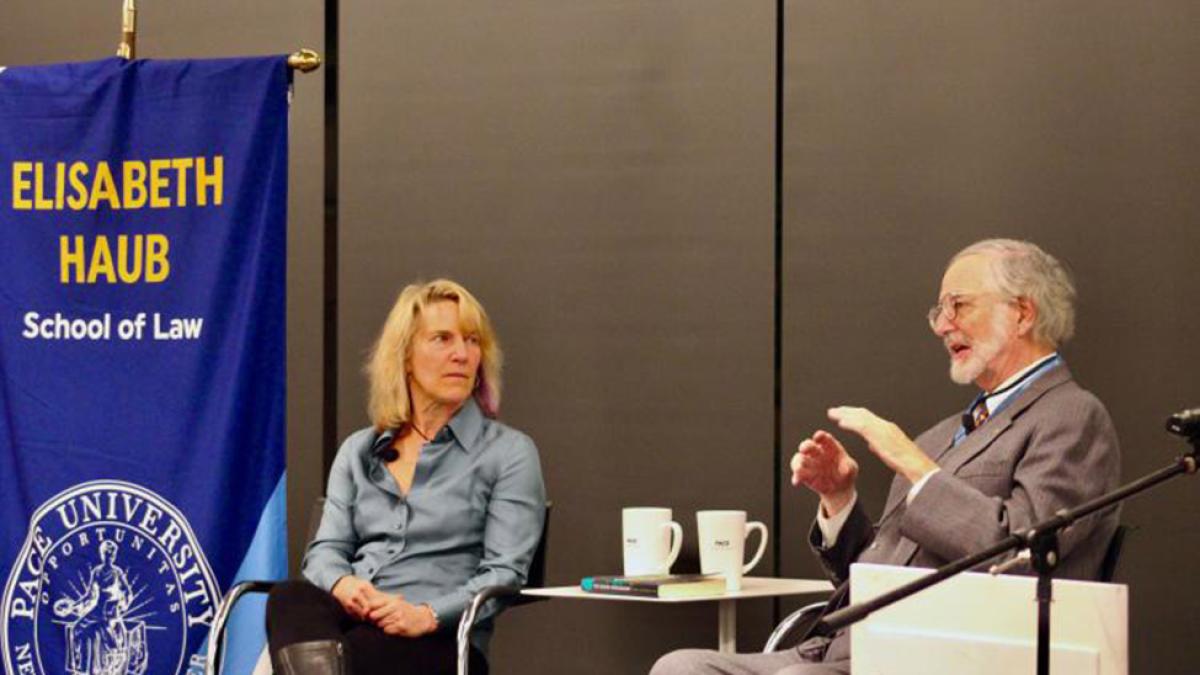
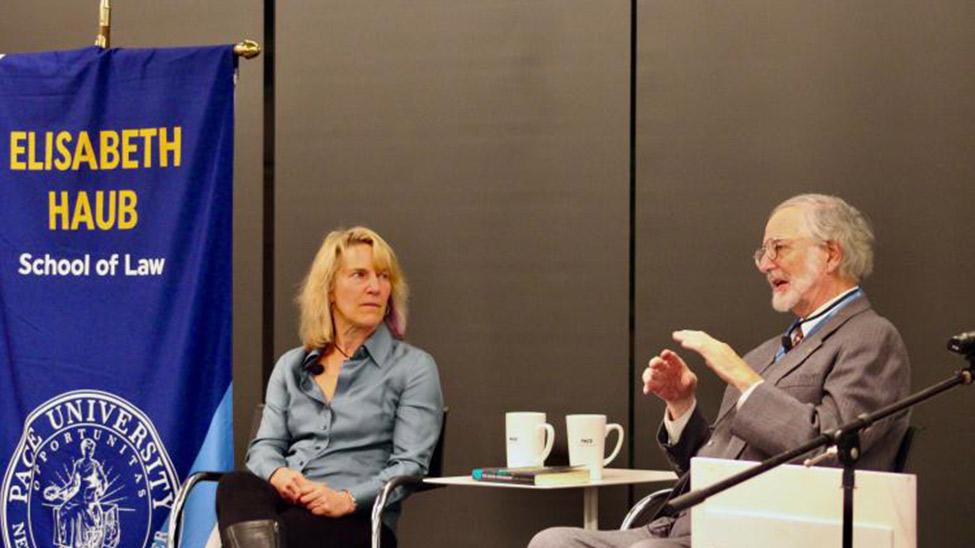
The Elisabeth Haub School of Law at Pace University hosted the launch of author and alumna Maya K. van Rossum’s book, The Green Amendment: The People's Fight for a Clean, Safe, and Healthy Environment, on Pace University’s New York City campus on Thursday, October 27. In this new edition of her book, officially released November 1st, van Rossum presents her radically simple plan for a green future: bypass local laws and turn to the ultimate authority—our state and federal constitutions—to ensure we have the right to a healthy environment. Author Maya K. van Rossum was joined by her former law school professor, Nicholas A. Robinson, a renowned scholar and pioneer in the field of environmental law, who led an insightful and engaging discussion focusing on the roadmap van Rossum outlines in her book for a healthier world. The event was attended by influential environmental law experts and eco-advocates.
“The reason why I think we need a constitutional green amendment in every state constitution across the United States of America, and ultimately, at the federal level, is because the way our U.S. system of laws was written, and the way it has been increasingly implemented overtime, is it is really focused on legalizing environmental pollution and degradation through reviews and permits,” said van Rossum. “It’s not really focused on preventing harm in the first place.” Van Rossum is founder of Green Amendments For The Generations, a national nonprofit organization dedicated to inspiring a movement to amend state constitutions to recognize and protect environmental rights on par with other inalienable civic and political freedoms. She is also the Delaware Riverkeeper, leading the regional advocacy organization, the Delaware Riverkeeper Network, for over 27 years.
“The magic I see happening here is that now through states adopting the green amendment, we are basically taking a watershed, an interstate watershed that happens to have a compact and breathing into it a high obligation to protect, not just the water, but the environment as a whole,” Professor Robinson shared.
Watch the book talk below or learn more about the book at For The Generations
About Green Amendments For The Generations (GAFTG) is a non-profit environmental advocacy organization dedicated to inspiring, supporting, and enforcing constitutional Green Amendments - self-executing and enforceable environmental rights amendments that protect the right to clean air, pure water, a stable climate, and healthy environments - throughout all fifty states and ultimately at the federal level. GAFTG is currently working with communities in over a dozen states, including New Mexico, New Jersey, Delaware, Washington, Maine, and Hawaii, among others. GAFTG has increased the enforcement of Green Amendments in Pennsylvania, New York and Montana, the only 3 states with Green Amendment protections currently in place. To learn more, visit For The Generations.
Q&A with Nicolina Barone '24
Nicolina Barone '24, Writing and Cultural Studies, who published a book that was ranked among Amazon's Top 30 New Releases in Poetry, relishes the small liberal arts feel of Dyson, which has provided close connections with faculty and countless opportunities to get involved.
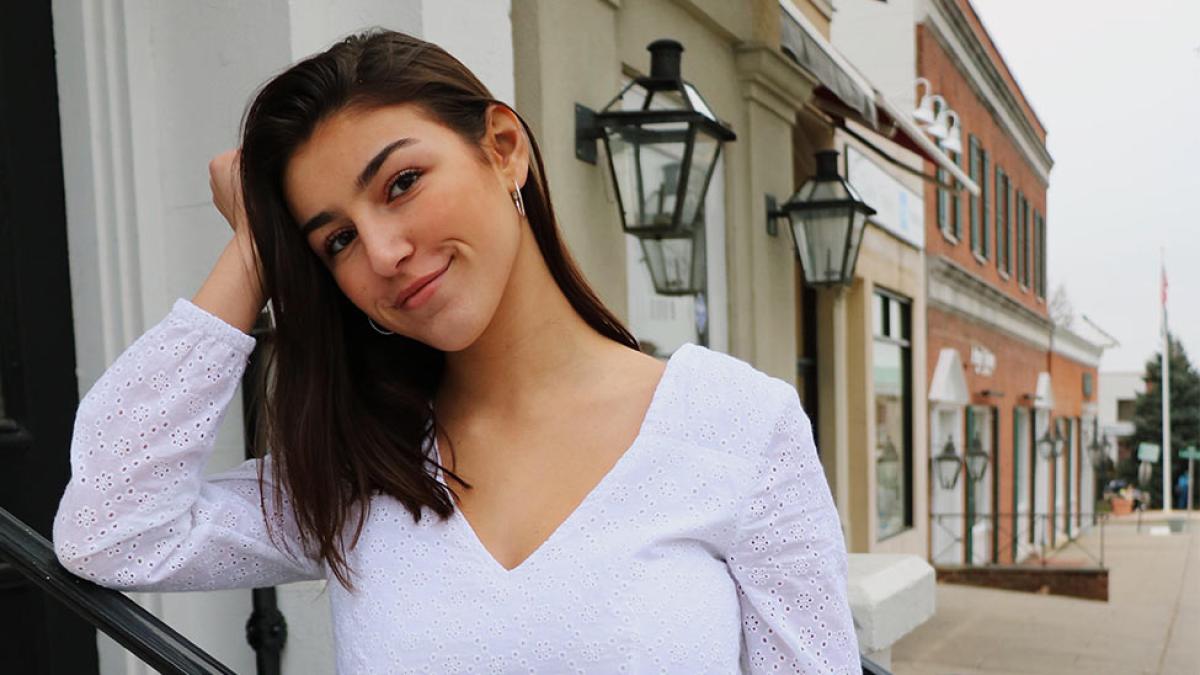
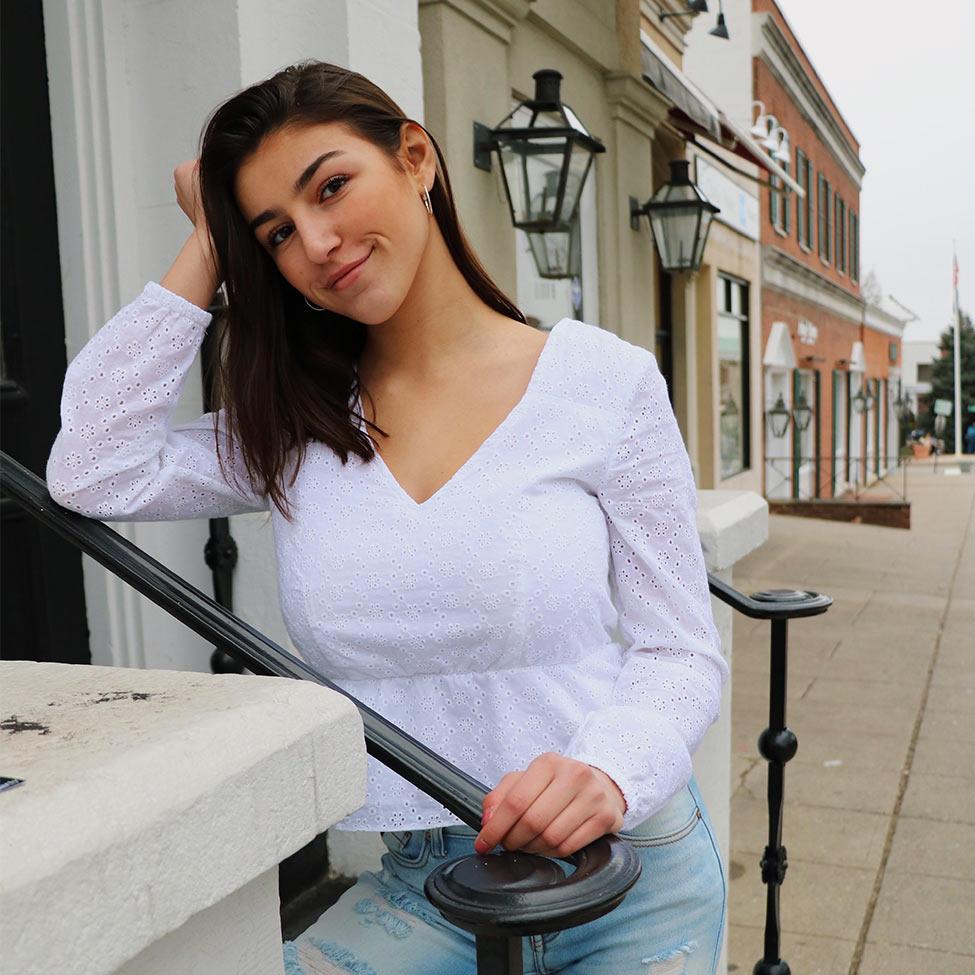
How did you become interested in pursuing a major in Writing and Rhetoric?
Writing and reading have been part of my identity since the earliest stages of my life. Words bring people together, connecting us through our experiences, and allowing us to understand that we are never truly alone in our thoughts and emotions. I always knew that my future career would involve working in the literary world.
Why did you choose to attend Pace?
I chose Pace because the MS in Publishing program was among the top five in the country at the time of my application and this seemed like the perfect way to get my foot in the door and learn more about a career in writing and editing. I plan to start the combined degree program this spring 2023 and graduate in 2024.
What have your experiences been like with the Writing and Cultural Studies Department? Have certain faculty members been instrumental in your academic journey?
The advantage of being part of a small liberal arts college was that I could make lasting and impactful relationships with my professors, and I have had so many positive experiences with those in the Writing and Cultural Studies Department.
The first professor I met who only furthered the idea that I chose the right major was JoAnn Schlesinger. I have taken three classes with her at Pace, and we developed a bond outside of the classroom as well. One of my essays from her class won the Writing and Cultural Studies Department Writing Award, and she has given feedback on the novel I hope to publish, which helped me win the Billie and Curtis Owens Fiction Award for the first 25 pages of the novel.
Kate Mulhollem was also a fundamental faculty member in my time here at Pace. When I first began working in the Learning Commons as a Writing Center consultant, Kate was my boss. She gave me the first job I have ever been fully excited about and interested in. I loved watching the way she worked with students and the techniques she used to tutor, and I truly learned a lot from her and ways to implement it in my own tutoring sessions.
Additionally, Dana Cadman has been another important faculty member, as the faculty advisor of CHROMA, Pace’s literary and arts journal, of which I am president and managing editor. My goal has been to get CHROMA on the map and ensure that everyone on campus knows about our club and wants to get involved, and she has assisted me every step of the way, ensuring we create an amazing, inclusive community of creatives on campus. Dana will also be assisting me as my advisor for my Honors Creative Thesis which I will be presenting this spring 2023. I am so excited to have such a talented writer and professor help me along the way!
I would also like to highlight that Rob Mundy and Bette Kirschstein have also been instrumental in my academic journey in countless ways.
The advantage of being part of a small liberal arts college was that I could make lasting and impactful relationships with my professors, and I have had so many positive experiences with those in the Writing and Cultural Studies Department.
You’ve recently had an internship at WebMD. What was your role and what has this experience been like for you?
My experience as an editorial intern with Krames, a subsidiary of WebMD, was absolutely amazing, as it single-handedly sparked my interest in a career in medical writing and editing. My role was to edit health, wellness, and medical content for tone, style, reading level, and flow, as well as ensure accordance with the client’s style guide. I also carefully fact-checked medical research-based content against approved sources and wrote original content for a series of topics including patient education materials. It was an extremely gratifying experience to see the assignments I had worked on become publications.
What activities and organizations, if any, have you been involved with as a student?
I am the managing editor and president of CHROMA, Pace’s literary and arts magazine, after first serving as a writer and poetry editor. I also have been involved in writing and editing for the Pace Chronicle and HerCampus. In addition, I am a mentor for the Pforzheimer Honors College (where I also serve as secretary on the council), a participant in the Setter’s Leadership Program and the National Society of Leadership and Success, and a Writing Center consultant for the Learning Commons. Further, I am an advocate for Colleges Against Cancer and helped run the Relay for Life last year.
Are there any challenges you have overcome, that you are proud of and would like to share?
After the ending of two romantic relationships, I felt as though I had lost myself and who I was. Instead of letting the pain consume me, I used it as a drive to chase the dream I had wanted to achieve my entire life: publishing a book. I combined three years’ worth of writing to create a poetry book, Serendipity, and then went on to self-publish it on Amazon. I wrote, formatted, edited, and published this book that went on to sell hundreds of copies. Upon release, it ranked on Amazon’s Top 30 New Releases in Poetry and Top 10 in the Death, Grief, and Loss genre. Publishing my book taught me that I can use pain as a motivation to succeed, grow, and become a better version of myself. My book not only helped me and my own healing process, but was able to help so many others who had gone through similar experiences. I even planned, hosted, and read pages of my book at a signing in Hug a Mug Café in Pompton Lakes, New Jersey.
What would you like to do upon graduation/what are your career goals?
I plan to start the five-year Master’s in Publishing program this spring and, ultimately, work as a medical writer or editor. I also plan to pursue writing and publish a romance novel.
What advice, if any, would you like to give to our current students?
Follow your passion and dreams. Throughout the years, I have received a fair share of feedback on my choice of a major, but that has never stopped me from pursuing my dream. Students must realize that a dream can only be achieved through the perseverance of effort. We are in charge of our own lives, and if there is one thing you can control, it is how hard you work and how badly you want it.
More Student Stories
Brooke Lyn Sicignano '25 has been acting since she was six years old. Now, through the Acting—International Performance Ensemble program, she's developing collaborative skills, exercising creative abilities, and waking up each day excited to learn more.
"To be able to share the stage with my classmates and living in New York City is truly a blessing. Being taught by the best of the best is truly an honor," said Victoria Beaudion '23, BFA Commercial Dance.
Jeremiah Williams '23 found his place on campus within the political science department. He cites courses taught by President Krislov and Matthew Bolton as influential in his journey to understanding the political world.
'Who does he think he is?': Legal analysts predict Trump's video deposition in Bronx trial will infuriate jurors
According to Randolph McLaughlin, Pace University law school professor, Bronx juries love sticking it to the rich and there is not a lot of love in the borough for the former president. “I’m a civil rights lawyer. If I can get a case into the Bronx, I’ll move heaven and earth. Bronx juries, they engage in Robinhood-ism. They take from the rich and give to the rest of us – their verdicts are always generally right at the ceiling,” he explained. "There’s no limit in the Bronx. They love to give money to the people. Donald Trump, as much as he is loved in certain corners of the country, he is not loved in the Bronx.”
